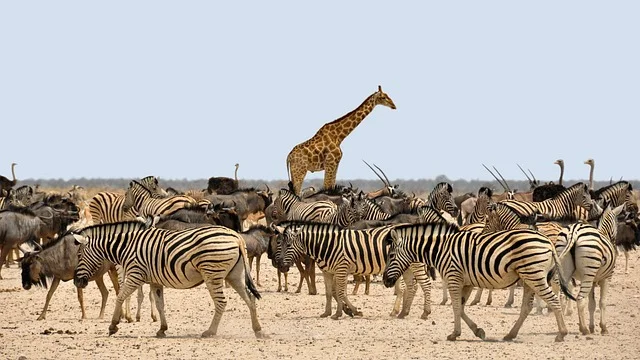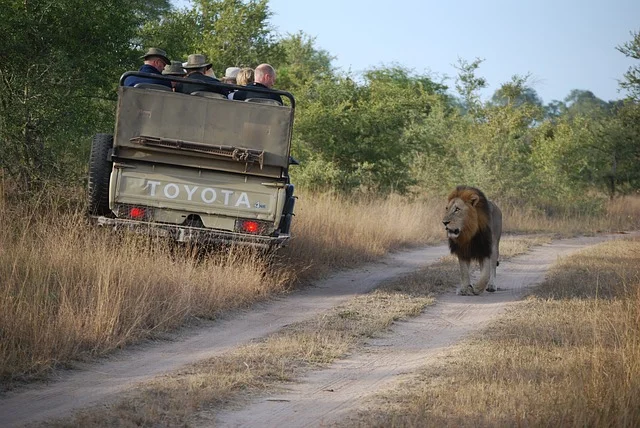Sustainable Tourism Safaris
People nowadays want to travel responsibly and with an end in mind or simply for a positive purpose.
As we travel broader, greater distances and quicker, it becomes even more vital that we all try to look after the great destinations we travel to, including their wildlife and local towns and villages.
Amazing Safaris partners in multiple programs that promote environmentally friendly travel. Eco-friendly policies, donations to conservation societies and agencies, and community engagement are a few examples.
Safari Tours’ Effects on Conservation
Seeing Africa’s amazing animals in their natural surroundings is a dream come true for thousands. It offers chances to see giraffes happily eating on the twigs and leaves of Acacia trees. To view birds so beautiful they resemble creatures out of a dream novel, or perhaps to get a close-up look at the most recent generation of critically endangered black rhinos.
There are tons of thrills, joy, and danger in this journey. However, below the surface charm of this once-in-a-lifetime journey into the woods lies an important question:
How Do Safari Tours Affect Africa’s Conservation?
It could amaze you to learn that wildlife tourism plays a key part in saving Africa’s highly endangered biodiversity. Actually, tourism revenue is what maintains habitats, jobs for communities, and animal safety in many nations.
Wildlife tourism boosts the local economy and helps maintain communities. When wildlife offers economic opportunities, it can promote to locals the value of protecting and maintaining their natural resources.

How A Safari Benefits the Environment and People
There are several advantages that safaris can provide to the environment and nearby populations. Here are a few significant ways that they make a beneficial contribution:
Funds for Ecological Protection:
Preventing Poaching Through Increased Surveillance: Poachers are discouraged from entering regions where they run the risk of being discovered just by being present during operations in these natural areas. Anti-poaching initiatives benefit from merely being in a region.
Knowledge and Economic Support for Native Neighbourhoods:
Education can take two forms: it can be obtained through employment, where employees receive new skill training and advance through the ranks, or it can be obtained through the sponsorship of nearby schools and teacher salaries.
Park Fees: The employment of anti-poaching workforce members, their gear, and their efforts to stop shooting and stealing are directly funded by your national park fees and conservation charges.
Employment: A wide range of employees, including guides, cooks, waiters, operations, reservations, and marketers, are employed by the safari camps you visit. These employees in turn provide for their families.

Wildlife Rehab and Habitat Restoration:
Biodiversity: Often, the only thing preventing habitat destruction due to human settlement is wildlife tourism. Communities that do not directly profit from wild areas will use the land for other purposes, such as farming, logging, or mining, all of which are disastrous for biodiversity.
Reasons Why Safaris Are a Perfect Way
Given the growing risks of climate change and biodiversity loss, we as humans must think carefully about where we will travel and the environmental effects of those decisions.
I truly feel that taking an African safari will definitely help to preserve unique wildlife species and their natural environments. Also, you support the livelihoods of several members of the local community who take care of their natural heritage.
How to Be an Ecotourist
Here’s where I come in, to be an eco-friendly tourist you have to pick eco-friendly lodging! Refrain from promoting excessive travel. Employ environmentally friendly goods (shampoos, soaps, etc.) Steer clear of single-use plastics. Instead of taking many flights, think about remaining longer in one place or nation. Save energy and water. Think about visiting outside of the busiest travel times of the year. Don’t feed or approach too closely to wild animals out of respect.
Tips on Informed Flight Booking
The route you take to go to your environmentally friendly African safari can give you nightmares. Unfavourably flying is the only way to get there for the majority of us. Although we cannot minimize the effects of flying, we firmly think that taking an eco-friendly safari has more positive effects on conservation than negative ones.
When planning your travel, please take into account the following:
- Steer clear of short-haul planes. About 25% of aircraft carbon dioxide emissions, according to the space agency, happen during take-off and landing. The ideal choice is to fly nonstop instead of making multiple connections. Flying gets more efficient as the distance increases.
- Choose more recent aircraft models and optimized flight routes When feasible, take direct routes as well.
- Consider purchasing carbon offsets but choose them properly. Alternatively you can invest in carbon offsets, which allow third party services to reduce your pollution by running projects that prevent greenhouse gases (carbon dioxide) from being released into the atmosphere.
Inspiring Future Environmental Leaders
We strongly support safari guide training and urge everyone to take it. It is not just for people who want to follow their job route, many people also do it as a means of enrichment and as a longer vacation. You learn far more from the training than just the abilities required to work as a safari guide, that much is certain. Along with introducing you to the many dangers the natural world faces, the training also fosters a strong bond with the natural world. Many trainees carry new ideals they gained on the course back home with them, implementing them into local conservation initiatives.

What Are Environmentally Friendly Hotels?
Hotels that are also referred to as environmentally friendly believe in a list of rules made with the intention of reducing tourism impact negatively on our environment. There are not any specific rules as to what exactly an eco-friendly hotel needs to have, but whether the place is energy efficient and has a program in dealing with trash can provide you hints that it cares for the environment.
One of the primary forces behind the rise of environmentally conscious hotels in recent years has been the tourism industry. Modern resort management prioritizes both guest comfort and environmental preservation through the employment of modern technology and eco-friendly policies. These spots actively work to reduce their environmental effect, making them models of sustainable travel practices.
With more and more eco-minded hotels appearing, travellers have a wider selection when it comes to where they stay somewhere feels good while having less impact on the environment. A top pick for those seeking a posh, but also environmentally friendly place to stay is an Eco Hotel. read — sustainability & luxury in perfect harmony : those hotels wager the worlds most enjoyable stay on this combination of both fostering a sense…
Is Wildlife Conservation Affected by Safari Tourism?
Responsible tourism management greatly helps efforts to preserve. Protected areas and national parks are maintained and expanded with the help of tourism revenue. But it’s crucial that you pick a safari company that prioritizes conservation while making your decision.
How Can I Choose a Reliable and Quality Safari Tour
To make sure your safari experience supports conservation efforts, selecting an eco-friendly tour operator is vital. Seek sustainability certificates and certifications, such as those from reputable environmental organizations.
Conclusion
In conclusion, safari tours do indeed have a positive effect on African conservation and overall global safari conversation. Safari tours have an important effect on global conservation. These well-placed centers not only offer critical resources for conservation efforts, but also raise awareness about the importance of protecting wildlife species and their environments at a time when continued human expansion threatens untamed lands.
Travelers can help to protect Africa’s incredible biodiversity by selecting a well-known safari company and going on a quality driven safari. When conducted ethically, safari excursions are a means of protecting the inherent beauty of the wild, not just a trip there.
Hope It was great information for you so Follow us.
